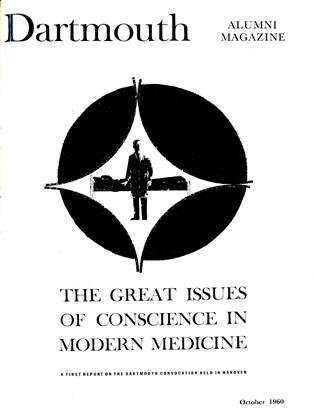DARTMOUTH'S annual blood transfusion occurred last month with the arrival of the Class of 1964, the 194 th in unbroken succession since Levi Frisbie, Samuel Gray, Sylvanus Ripley, and John Wheelock made up the first Dartmouth class, of 1771. The first class and the newest class have certain things in common, but size is not one of them. Multiply the foursome of 1771 by two hundred and you will have the expected size of 1964, which had exactly 800 men still on the active list just prior to matriculation.
With approximately 800 men, the Class of 1964 will be considerably below last year's record entering class of 842 and a bit smaller than the Class of 1960, which matriculated 805 men; but it is nevertheless "oversubscribed" in the eyes of the Admissions Office, which set a target of 775 freshmen for this fall. The new class represents, in fact, a record yield in relation to the number of letters of acceptance that went out last spring. Last year the Admissions Office made 75 fewer acceptances than in 1958 (771 freshmen) and ended up with 842 freshmen. This year it made 200 fewer acceptances than last year and still ended up with an oversized class of about 800 men. Obviously, the attrition of accepted men from May to September isn't what it used to be.
"The brightest class ever to matriculate" is. becoming almost a standard description of each succeeding year's entering group. The Class of 1963, which had record College Board test scores last year, has been markedly surpassed by '64. Among the 800 men expected to matriculate last month, the median verbal aptitude score was 621, compared with 592 for the Class of 1963, and the median math score was 650, compared with 638. The median score is the middle point among all the scores made by the entering group.
The Class of 1964 has two other record figures to its credit: 83% of its members stood in the top quarter of their secondary-school classes, and 60% stood in the top tenth. A total of 548 different schools are represented in the class, which comes 73% from public schools and 27% from private schools — a division that has remained stable for the past three years. The men of '64 have come from 45 states, as well as a dozen foreign countries. One of these foreign students is Ephraim Aniebona of Enugu, Nigeria, the first of the Nigerian students to come to Dartmouth under a cooperative scholarship program in which 24 American colleges and universities will eventually bring more than a hundred African college students to this country each year.
The Class of 1964 is the second to enter under the Early Decision Plan, which grants admission to exceptional students early in the senior year of secondary school if they definitely commit themselves to Dartmouth and drop applications elsewhere. In the first year of the experiment, 96 of 143 men who applied for early decision were accepted that way; this year, 147 of 228 who applied were awarded early acceptance. Applicants not accepted early are considered again under the regular admission procedures.
This fall's freshmen are the first to have the benefit of Dartmouth's more liberal plan of recognizing exceptional academic preparation in secondary school. Advanced placement in individual subjects has been a standard practice for some years, and advanced standing of an entire year has been accorded to outstanding students after they had proved themselves at the college level. Now, the entering freshman who has demonstrably done college-level work is immediately given course credit as well as advanced placement, and advanced standing is also offered immediately if he has already done the equivalent of five college courses in three disciplines.
 View Full Issue
View Full Issue
More From This Issue
-
 Feature
FeatureMedicine's Moral Issues
October 1960 -
 Feature
FeatureA Rare Kind of Movie Star
October 1960 By RAYMOND J. BUCK '52 -
 Feature
FeatureDartmouth's Medical Opportunity
October 1960 By WARD DARLEY -
 Article
ArticleTHE FACULTY
October 1960 By HAROLD L. BOND '42 -
 Class Notes
Class Notes1911
October 1960 By NATHANIEL G. BURLEIGH, ERNEST H. GRISWOLD -
 Class Notes
Class Notes1933
October 1960 By WESLEY H. BEATTIE, GEORGE N. FARRAND
Article
-
 Article
ArticleKey to Abbreviations of Branches of Service
November 1942 -
 Article
ArticleSpaulding-Potter Grant Spurs Regional Program
DECEMBER 1968 -
 Article
ArticleSoccer and Cross Country
NOVEMBER 1965 By E.R. -
 Article
ArticleFaculty
JANUARY 1972 By ROBERT B. GRAHAM '40 -
 Article
ArticleAn Athletic Tax
January 1935 By The Editors -
 Article
ArticleNotebook
Mar/Apr 2009 By WEBB CHAPPELL

